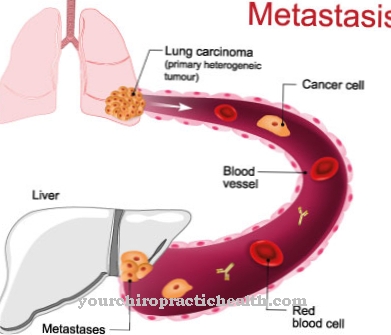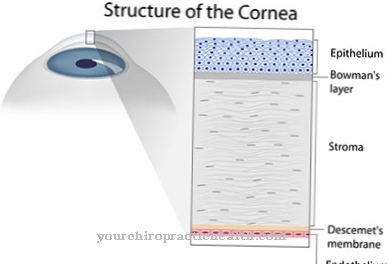At the Frontal brain syndrome there are injuries to the frontal lobe. Lesions in this area of the brain usually manifest themselves in cognitive and behavioral disorders such as pseudopsychopathy. Treatment depends on the primary cause of the damage.
What is Frontal Brain Syndrome?

© bilderzwerg - stock.adobe.com
Cognition and character are located in the human frontal lobe. The brain area is also known as the prefrontal cortex and is involved in all monitoring and analysis functions. The brain area thus plays a decisive role in human behavior. The frontal lobe has links to all other areas of the brain and enables a quick and effective exchange of information.
Due to the numerous connections to the limbic system, the basal ganglia, the cerebellum and the thalamus, the frontal lobe is able to ideally adapt human behavior to the current situation. Damage to the anterior parts of the frontal lobe is known as frontal lobe syndrome. Similar to the dysexecutive syndrome, the frontal lobe syndrome mainly disrupts the executive functions of the brain.
The expression of the dysexecutive syndrome already indicates symptoms: in particular the disturbance of the executive brain functions. In contrast, the term frontal brain syndrome does not indicate any specific symptoms, but only refers to the localization of a brain lesion. Executive functions are not always disturbed in frontal lobe syndrome.
Thus, the frontal brain syndrome can theoretically express itself in a dysexecutive syndrome, but does not necessarily have to appear as a dysexecutive syndrome. The two terms are therefore not synonyms.
causes
Frontal lobe syndrome results from damage to the anterior frontal lobe. This damage can occur in the context of accidents due to bleeding, occur in the context of strokes, be associated with inflammation or be caused by degeneration. Incorrect blood flow or tumors can also trigger frontal brain syndrome.
Depending on the exact location, the syndrome is associated with different disorders, such as cognitive impairments, behavioral changes or even pseudopsychopathy. Basically, the prefrontal cortex is divided into a dorsolateral prefrontal cortex and an orbito-frontal cortex. In the first part there are mainly cognitive functions, such as problem solving, planning ahead and goal-oriented action.
In the orbito-frontal part there are personality traits and emotion regulation. With lesions of whatever type in the frontal lobe, humans can no longer adapt their behavior flexibly and sensibly to new circumstances. The type and exact location determine the symptoms of the frontal brain syndrome. This means that two people with frontal lobe syndrome can have radically different conditions depending on the lesion.
You can find your medication here
➔ Medicines to calm down and strengthen nervesSymptoms, ailments & signs
With a lesion in the cognitive parts of the frontal lobe, cognitive disorders occur. In addition to problem analysis disruptions and disruptions in the production of ideas, linguistic reduction can occur. The ability to adapt decreases and the patient tends to perseveration. Sometimes the patients find it difficult to comply with and violate rules.
Routine actions are not used in a targeted manner. The plausibility of actions is no longer checked. Patients rarely or not at all develop alternative plans. You have difficulty paying attention to several pieces of information at the same time. They do not foresee the consequences of action. In addition, they do not learn from mistakes and act impulsively.
Your willpower often goes down. Frontal brain syndrome can also primarily manifest itself in behavioral disorders. In pseudo-depression after frontal brain damage, motor slowdown and speech impoverishment can occur. At the sensory level, a lack of responsiveness or even apathy is conceivable.
Emotional-affective symptoms such as a depressed mood with low self-esteem, self-rejection or emotional indifference are conceivable. Loss of drive and interest, loss of initiative and a reduction in sexual desire occur.
In addition to neglecting one's own appearance, there is social withdrawal. At the cognitive level, as well as inability to make decisions, there is above all an attention and concentration disorder. Sleep disorders and tiredness shape the bio cycle. The pseudopsychopathy after frontal brain damage must be distinguished from pseudodepression.
Motor hyperactivity meets sensory hallucinations. A manic, euphoric mood can exist as well as paranoid delusions and outbursts of aggression. Emotions such as laughing and crying are no longer appropriate.
In addition to hypersexuality, there is a lack of tact, lack of social conventions, a lack of ability to distance yourself, disinhibition, vulgar language and confabulations. Cognitively, the patients are often fleeting of ideas, addicted to jokes or disturbed attention and concentration. The biocyclic need for sleep decreases.
Diagnosis & course
The diagnosis of frontal lobe syndrome is made by the neurologist using imaging. Depending on the symptoms and the location of the lesion in the imaging, the neurologist specifies his diagnosis as a dysexecutive syndrome, pseudo-depression, or pseudopsychopathy.
The prognosis for patients with frontal lobe syndrome is usually unfavorable, since brain damage in most cases leaves function-impairing scars. The most unfavorable prognosis is degeneration. Benign tumors have the most favorable prognosis. In this case, with the removal of the tumor, all symptoms usually subside.
When should you go to the doctor?
A doctor should be consulted as soon as irregularities and noticeable changes in behavior, habitual thought patterns or emotional processing occur. If the mental performance suddenly deteriorates or if there are problems with knowledge retrieval, there is cause for concern. If impulse control is defective, if hyperactivity sets in, or if there is severe indifference and apathy, the symptoms should be investigated and treated.
A doctor is needed for problems with information processing, amnesia, and sporadic unusual memory lapses. A check-up is necessary as soon as a person's personality changes significantly and he looks strange. Aggressive demeanor or very weepy behavior that was not previously shown by the person concerned must be clarified. If the daily obligations can no longer be fulfilled or if depressive moods arise, it is necessary to consult a doctor.
If hallucinations or delusions set in, if confused statements are made or if language changes take place, medical treatment must be initiated as soon as possible. Vulgar formulations, disinhibition or an inappropriate euphoria must be investigated. A doctor is needed in the event of concentration disorders, sleep problems and persistent fatigue. A doctor should be presented with strong emotional indifference, empathy and recklessness, reduction in sexual desire or self-destructive behavior.
Doctors & therapists in your area
Treatment & Therapy
Therapy in patients with frontal lobe syndrome depends on the primary cause. If inflammation in the frontal lobe is responsible for the symptoms, this inflammation must be contained as soon as possible. In bacterial infections, cortisone and antibiotics are given at the same time so that the antibiotic can cross the blood-brain barrier.
High cortisone therapy is used for autoimmune inflammation. Tumors are removed as far as possible or, if necessary, irradiated. Behavioral therapy and supportive therapy to promote cognitive abilities can make sense to stimulate the transfer of certain brain functions to areas of the brain that are still intact.
In many cases, however, this attempt remains unsuccessful and the patients no longer find their way back to their original personality or behavior. Above all, degenerative diseases and the resulting damage are still difficult to treat. The relatives of those affected often receive psychotherapy to help them deal with the situation.
Outlook & forecast
In most cases, the prognosis for frontal brain syndrome is poor. Nevertheless, an exact outlook on the further development of the disease can only be given once the causal cause of the disease has been determined. In addition, a prognosis is only possible with extensive knowledge of existing damage and the general health of the patient.
In the case of a benign tumor or mild circulatory disorders that are located in an area of the frontal lobe in which few impairments are triggered, the patient has a good chance of improvement. In individual cases, a full recovery cannot be completely ruled out. With targeted medical treatment, it is possible to completely remove the diseased tissue.
The larger the tumor or the circulatory disorders, the more likely permanent and irreparable disorders of the tissue are. In the case of a malignant tumor, the chances of recovery worsen considerably. Cancer therapy tries to prevent further growth and to reduce the size of the tumor.
In addition, depending on the location of the diseased tissue, a surgical procedure is carried out. This can result in complications or further damage to the brain tissue due to scarring. If the growth of a tumor cannot be prevented or if no medical care is sought, the disease is usually fatal.
You can find your medication here
➔ Medicines to calm down and strengthen nervesprevention
The frontal lobe syndrome can only be prevented to the extent that lesions of the frontal lobe can be prevented, for example diseases such as Alzheimer's, multiple sclerosis or strokes, tumors and cerebral hemorrhage. Comprehensive prevention is therefore impossible.
Aftercare
The options for follow-up care are very limited in frontal brain syndrome. The patient is primarily dependent on medical care to alleviate the symptoms of this syndrome, although a complete cure is no longer possible. The affected person is therefore dependent on lifelong therapy.
Life expectancy is also limited by this syndrome, although this also depends very much on the exact cause that led to the disease. In most cases, frontal brain syndrome is treated with antibiotics. The person concerned is therefore dependent on the correct and regular intake of the antibiotics, whereby possible interactions with other drugs must also be considered.
A doctor should always be consulted if there are any doubts. Furthermore, when taking antibiotics, alcohol should be avoided as much as possible, as alcohol weakens the effectiveness of the antibiotics. It is not uncommon for those affected with frontal brain syndrome to rely on the help and support of family and friends in everyday life.
Above all, very intensive and loving care has a positive effect on the course. In some cases, the relatives of the person affected may also need psychological treatment.
You can do that yourself
The possibilities for self-help are very limited in frontal brain syndrome. Normally this is permanent damage to the brain, in which the person concerned has little or no influence. Patients are dependent on outside help and should therefore be examined and treated professionally.
A timely use of a medical examination and therapy is necessary. Without medical care, the damaged areas of the brain can spread. Individual training measures can be discussed individually within a treatment.
As far as possible, a positive and affirmative attitude towards life helps with illness. This is helpful in making progress in therapy. In addition, negative environmental influences must generally be avoided. This includes the consumption of toxins and pollutants such as nicotine, alcohol or drugs.
Brain training supports the existing functional possibilities. The organism performs monitoring and analysis activities in the prefrontal cortex. After imaging has been used to determine which regions are damaged or impaired, targeted therapy can be carried out.
In everyday life, the person concerned should be mindful in order to be able to assess his own body functions well. If existing skills decrease or there are further losses in performance, it is advisable to seek help as soon as possible. The better the self-reflection takes place, the sooner a diagnosis can be made.


.jpg)
.jpg)


.jpg)




















